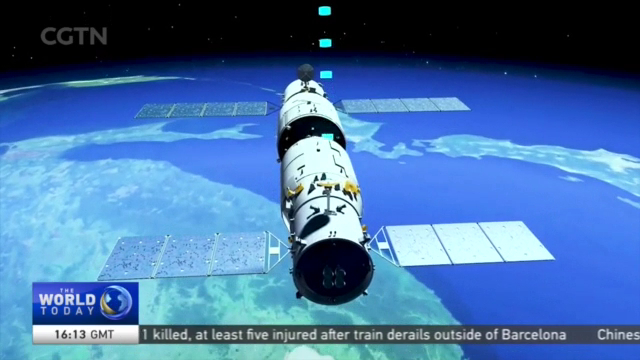
08:20, 21-Nov-2018
Tiangong-2 Spacelab: Mission supported by several scientific breakthroughs
Updated
08:01, 24-Nov-2018
02:30

In 2016, China successfully launched the Tiangong 2 space lab, as a prelude to an eventual space station. Now, the spacelab has fulfilled its mission, with several major breakthroughs in science and space exploration. Our reporter Ning Hong has more.
Being able to tell time precisely is important, but it is still a technical challenge.
Even the most accurate clock, a cold atom clock, could still lose track of time.
Chinese scientists took that task a step further, as they tried to build such a clock in space for China's first spacelab, the Tiangong-2.
The clock passed a space test in September 2017. Scientists say they now want to improve on that technology.
LIU LIANG, CHIEF DESIGNER, COLD ATOM CLOCK IN SPACE SHANGHAI INST OF OPTIC & FINE MECHANICS, CHINESE ACADEMY OF SCIENCES "We are trying to build a more precise cold atom clock, by taking the advantage of the microgravity environment in the Tiangong-2. We are also trying to further reduce the temperature of the atom."
The environment in space is helping scientist do the tests they couldn't do on earth.
Inside the lab of the institute of high-energy physics, professor Zhang is working with his students on this new model of gamma ray bursts telescope.
Using the polarization of gamma ray bursts, it opens a new window to look into the space.
ZHANG SHUANGNAN, DIRECTOR, PARTICLE ASTROPHYSICS KEY LABORATORY INSTITUTE FOR HIGH-ENERGY PHYSICS, CHINESE ACADEMY OF SCIENCES "The results we have will surely help us to better understand the formation of the black hole, and the merge of neutron stars."
Other than looking into the outer space, Chinese scientists are also paying attention to the ground. Their work includes some early steps to build a network of quantum telecommunication.
The encrypted photons are called quantum keys. Using this device, Liao and his team have successfully distributed quantum keys to two locations over one thousand kilometers away from each other.
LIAO SHENGKAI, LEAD DESIGNER SATELLITE-TO-GROUND QUANTUM KEY DISTRIBUTION TEST, CHINESE ACADEMY OF SCIENCES "The quantum key is like a random code book. We could use satellites to distribute quantum keys across the world, helping to encrypt communications between two places."
So far, China has been working with Austrian and several other research bodies to further verify this experiment.
As the Tiangong-2 is reaching its designed lifespan, it will be de-orbiting by September next year.
Ning Hong, CGTN, Shanghai.

SITEMAP
Copyright © 2018 CGTN. Beijing ICP prepared NO.16065310-3
Copyright © 2018 CGTN. Beijing ICP prepared NO.16065310-3